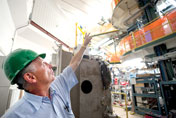New Position Aims to Commercialize FRIB, Other MSU Technologies
Ray DeVito, who earned a doctorate in experimental nuclear physics from Michigan State University, has returned to his alma mater as a technology manager for MSU Technologies. DeVito will pursue commercial opportunities for the discoveries that emerge from the soon-to-be-built Facility for Rare Isotope Beams (FRIB), as well as other MSU facilities.
While DeVito will work with a number of MSU units, including the National Superconducting Cyclotron Laboratory (NSCL) and the colleges of Engineering and Natural Resources, he will devote the majority of his time to FRIB.
"FRIB is taking everything to a new level," DeVito said. "Even though a lot of the technology already exists, we're putting it into a higher level of performance. We're only just starting to scratch the surface."
"MSU Technologies can play an important role in building bridges between the scientists and engineers who carry out innovative fundamental research and the entrepreneurs who will take some of these results and develop new products that are beneficial to society."
Konrad Gelbke
"The FRIB is one of the top economic development priorities for the Greater Lansing region," said Tim Daman, president and CEO of the Lansing Regional Chamber of Commerce. "We look forward to working with Ray and Michigan State University in the commercialization and development of FRIB technologies."

Konrad Gelbke at the National Superconducting Cyclotron Laboratory
Konrad Gelbke, director of the NSCL, said "history has shown that bold investments into science and technology have enriched our lives and paid handsome economic dividends in the long term. MSU Technologies can play an important role in building bridges between the scientists and engineers who carry out innovative fundamental research and the entrepreneurs who will take some of these results and develop new products that are beneficial to society."
Gelbke added that "FRIB's potential for creating jobs via spinoffs will likely exceed the economic impact that can be predicted from its fairly well-defined funding and staffing needs."
FRIB is a more than $600 million project funded by the Department of Energy and is expected to pump nearly $1 billion in economic development into the region. The facility will produce beams of rare isotopes that will help scientists better understand the origin of the elements and the evolution of the cosmos.